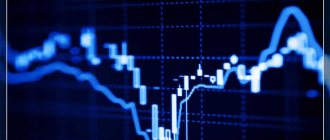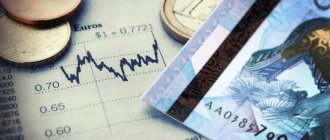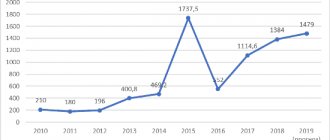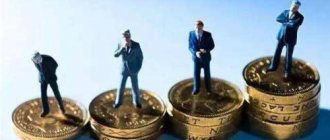Absolutely all investors have encountered the situation of falling share prices in their investment portfolio - both inexperienced novice investors and professional asset managers.
First of all, in such a situation there is no need to panic and make rash decisions, but to begin to understand in more detail why stocks are falling and what are the reasons for this.
In this article we will look at:
- The main reasons for the fall of shares.
- global macroeconomic reasons for the fall in stocks;
- speculative fall in shares;
- fall due to internal events in the company;
- structural changes in the company's business.
- We will answer the most important question of any investor, what to do in each specific case.
On the one hand, stocks are a very specific, risky and volatile asset, and the period when stocks fall is an integral part of their life cycle. If we look at the price chart of any stock, we will never see a straight line; absolutely all stocks move in waves, where periods of growth are necessarily followed by periods of decline.
Therefore, a fall in shares is an absolutely normal phenomenon that should be taken with due understanding.
On the other hand, there are serious reasons that can lead to a fall in stocks. And not just a fall, but a landslide fall, after which stocks may not recover for many years.
Reasons for falling stocks
The following main reasons for the fall in shares can be identified:
- Global macroeconomic reasons and force majeure of a general economic nature (realization of systematic risk).
- Speculative decline in shares.
- Internal events and force majeure of the company itself (realization of unsystematic risk).
- Structural changes in business.
Global macroeconomic reasons for the fall in stocks
These are negative events that affect all stock markets as a whole, as they have a serious impact on the level of economic growth around the world. As a result, this affects the business of almost all companies to one degree or another. As a result, the shares of the vast majority of companies react to such events by falling. Professional investors call these risks systematic risks. These are the risks that affect the entire economic system as a whole.
Vivid examples of such negative, risky events that cause a fall in all stocks are economic crises and force majeure events on a global scale. Recently, these have been the global financial crisis of 2008 and the global force majeure of 2020 - the coronavirus pandemic, which led to a lockdown of the entire world economy.
During such periods, the vast majority of stocks fall, as there are risks of a global slowdown in the world economy, a drop in demand and consumer activity. And as a result, against this background, there is a decline in the financial results of many companies from different industries. Even the “good” and “strongest” stocks decline during such periods under the influence of general market negativity and total stock market panic.
It is worth understanding that when we talk about “strong” and “good” companies, this does not mean that their shares can withstand market panics and collapses under the influence of systematic risk. Shares are a high-risk asset, and shares of even the “strongest” company fall like a stone under the influence of general market risk. So what is their strength then? The strength of such shares lies in the fact that they are able to quickly recover, cover their drawdowns and subsequently increase in price multiple times.
So in 2007, Apple was a very promising company, whose financial results were growing at a very high rate, at that time it was a new rising “blue chip” in the US market. You can read more about blue chip shares of US companies in our article “US Blue Chips”.
The company's results grew at a very high rate:
And from 2002 to 2008, the company's shares grew by more than 1,600%. However, under the powerful influence of systematic risk in 2008 during the global financial crisis, the company's shares fell by more than 60%.
However, such a strong stock drawdown did not in any way affect the company's global prospects and the strength of its financial results. And in the subsequent period from 2009 to 2021, the company's shares rose by more than 4,600%.
This is an example of how systematic risk locally can affect the shares of even a very strong and promising company, but is not able to break the long-term trend of growth and development of the company's business.
What to do if stocks fall amid a global decline in all markets?
Unfortunately, there is no way to neutralize systematic risk using stocks alone. The vast majority of stocks are susceptible to it, and neither a large number of companies in the portfolio nor the inclusion of companies from different sectors of the economy in the portfolio will help. The only way to protect yourself from this is by including fixed income instruments such as bonds in your portfolio (“Investing in bonds is an excellent substitute for deposits”). Moreover, the profitability of the share of such instruments in the portfolio should cover the potential risks of risky instruments, that is, shares, or reduce them to a certain level, which each investor determines for himself independently. We teach how to do this correctly and at a professional level in our investment training course from scratch to the professional level “School of the Intelligent Investor”.
Get rid of expensive funds
A market decline is a good opportunity to replace the expensive funds (ETFs or mutual funds) you have in your portfolio with similar ones. But with lower management fees.
Let's say you bought a fund on the S&P 500 index a couple of years ago with an annual commission of 1.1%. Competitors now offer similar products. But with expenses of 0.8%. Savings of 0.3% over long periods can provide additional profits of tens to hundreds of thousands.
What is the logic of selling in a falling market?
In calm times, such a rearrangement would entail additional costs. Most likely, existing ETFs would have to be sold at a profit. And lose 13% on this in the form of income tax. And perhaps, with such a castling, the current losses on taxes would not compensate for the potential benefits. From buying cheaper funds (and saving on commissions in the future).
If quotes decrease, you will not have to pay taxes. But then we will sell at a loss? Or with near-zero profit.
Yes. But in return you take a similar (lower cost) asset. Also with a discount. You can think of it simply as an exchange of fund shares. With small expenses in the form of commissions to the broker for the purchase and sale transaction.
Speculative fall in stocks
As we have already said, stocks are a risky and highly volatile asset. That is, the price of shares never stands still and does not grow in a straight line, even when everything is fine with the business of the company issuing the shares. Prices for absolutely any stock fluctuate constantly; a period of growth is necessarily replaced by a period of decline. The company's revenue and profit may grow at multiple rates, and shares may decline locally. And this will be absolutely normal.
Why is this happening? This occurs due to the heterogeneity of market participants. At the same time, completely different participants make transactions on the stock market: investors, medium-term speculators (swing traders), short-term speculators (day traders), ultra-short-term speculators (scalpers, pip traders). All these categories of market participants differ in the time period during which they expect to make a profit, and the rate of profit, that is, the amount of profit in one transaction that they consider sufficient for themselves to close the transaction. So investors buy shares for a long period of time (at least 2 years) and expect that their investments will bring a return that is calculated in tens of percent, or even hundreds. And ultra-short-term speculators buy shares for a few minutes or even a few seconds and expect to make a profit that barely covers the size of the commission on the transaction, that is, only a few hundredths of a percent. But they make a lot of such transactions, hundreds and even thousands.
Therefore, short-term speculators in the stock market play a very important role; they provide liquidity to all other market participants (“Security Liquidity”). That is, if you want to buy shares at any time, there will be a counterparty who wants to sell them to you, and vice versa. The payoff for this is that stocks in which there are many speculative players have a high amplitude of spontaneous fluctuations. Professionals say that such stocks are highly volatile.
Absolutely nothing can happen to the company's business, but the company's shares can rise and fall chaotically. It’s like constant rough seas; it’s almost always there. Moreover, for each stock this is its own individual “normal” amplitude of fluctuations. For some papers it may be more, for others a little less. This “normal” amplitude of price fluctuations can be measured in a special way, and the investor can understand what kind of movements are occurring in the market. For these purposes, there are special technical market indicators that allow you to measure the level of current volatility. Such indicators, as a rule, are based on the calculation of the dispersion and standard deviation of the price series.
In terms of understanding the “normality” and natural background of price fluctuations in the market, investors can use the Bollinger Bands indicator. It visually reflects the maximum permissible range of stock price fluctuations. That is, at any point in time, the price of a share can unpredictably change to the upper level of the price corridor or to the lower one, and at the same time this will be the norm for natural speculative fluctuations for this stock.
You can build the Bollinger Bands indicator, as well as view its description and the technical signals it can generate, in the Fin-Plan RADAR service in the “Technical Analysis” section.
What to do if stocks fall due to speculative fluctuations?
For investors, the answer is clear – nothing! These are natural market movements, there is no way to get rid of them in stocks, so you simply shouldn’t pay attention to them. It is also worth understanding that such fluctuations in stock prices are in no way related to the position and condition of the company itself and its business. For long term investment purposes they are completely safe.
Fall due to internal events in the company
In addition to the external background (macroeconomics, industry events), each company has an internal event background, that is, these are events that relate to the business and results of only this company. Naturally, these can be not only positive, but also negative events, to which shares react with a significant drop in quotes. In another way, such negative events are called unsystematic risk. That is, it is a risk that affects only the shares of one specific company.
As a rule, these events are sudden or force majeure. These can be various corporate events (mergers, acquisitions, major transactions with company assets, sale or purchase of large shares of the company), as well as significant operational events (change of large consumers and suppliers, accidents and changes in technological processes in the company). In this case, the main task for the investor is the correct fundamental assessment of these events at the current moment and in the long term for the company. At the current moment, the investor must understand whether this event will lead to a critically difficult situation in the company, which could put the company on the brink of survival even at the current moment. And in the long term, the investor must assess how much this will affect the company's long-term operating and financial results.
Let's look at a specific example. At the beginning of June 2021, a major man-made disaster occurred at MMC Norilsk Nickel[/anchor] - the destruction of fuel storage tanks, which resulted in a spill of more than 20 thousand tons of diesel fuel, which resulted in one of the largest environmental disasters in this region. This is a clearly negative event, which is why shares of MMC NorNickel fell by more than 8% in just one trading day, and as a result, due to this accident, the company's shares fell by more than 25%.
An environmental disaster threatened the company with large costs to eliminate its consequences, as well as a large environmental fine.
In order to make the right decision, the investor needed to understand how such a fine would affect the company's current financial position, as well as its long-term prospects.
Already 07/06/2020 Official information has appeared on the assessment of the extent of environmental damage due to an accident at the company's fuel and lubricants base. The amount of damage was estimated: to water bodies - 147 billion rubles, to soils - 0.74 billion rubles. The total amount of potential compensation is approximately 148 billion rubles.
Next, you should analyze the company's income statement and also look at its balance sheet. In terms of the company's profit, the damage is slightly less than half of its net profit and approximately 30% of the company's operating profit for 2019.
It is worth noting that approximately 55 billion rubles. in the structure of Norilsk Nickel MMC's profit is a variable component of exchange rate differences, the growth and loss of which the company faces every year. Of course, the very fact of a fine is not good and does not add to the financial stability of the company, but from the point of view of its operating results it is not critical and does not put the company on the brink of survival.
However, the important point is whether the company has the funds to pay this compensation without increasing its debt load. Having analyzed the company’s balance sheet, we see that in current assets the amount of cash and cash equivalents at the end of 2019 is equal to 172 billion rubles.
And in liabilities, the company has sufficient reserves of equity capital in the form of retained net profit.
In other words, this is cash on the company’s balance sheet, from which payments can be made. And this, theoretically, may not lead to an increase in the company's debt burden.
The size of the debt load is very important for the issuer, since it is quite high in itself, and also because the size of its dividend payments is determined based on the size of the company's debt load. This is determined based on the company's net debt to EBITDA ratio:
At the end of 2021, the ratio of net debt to EBITDA was at 0.9, which ensured a very high level of dividend payments to the company.
Net debt = long-term loans (RUB 528,230 million) + short-term loans (RUB 67,311 million) + other tax arrears (RUB 31,059 million) – cash and equivalents (RUB 172,333 million) = 454,267 million rub.
EBITDA at the end of 2021 was equal to 513,669 million rubles.
The resulting ratio was: 454267 / 513669 = 0.88
What will happen to the net debt to EBITDA ratio if compensation is paid? The company's net debt will increase as the amount of cash on its balance sheet decreases.
Net debt = long-term loans (RUB 528,230 million) + short-term loans (RUB 67,311 million) + other tax debts (RUB 31,059 million) – cash and equivalents (172,333 – 148,000 = RUB 24,333 million)
= 602267 million rubles.
In this case, EBITDA will not change by the amount of fines and compensation, since these are extraordinary expenses that are excluded when calculating EBITDA. Thus, the ratio will be equal to 602267 / 513669 = 1.17
And we see that this is not critical from the point of view of the company’s dividend policy (“What is the company’s dividend policy”). The ratio should be no more than 1.8. And the upper limit of dividend payments of 60% of EBITDA remains in this case.
Having carried out such an analysis, an investor can easily conclude that, despite the frightening size of the fine of 148 billion rubles. it will not critically affect the company's current or long-term strategic plans and results. The main difficulty is that not every investor can conduct such an in-depth analysis at a professional level, and this requires special knowledge and practical skills in financial analysis of a large company.
However, subscribers to our “Investor Club” service received such detailed analytics immediately after the accident in the company and were able to make the right decision, not to panic and not to sell shares of MMC Norilsk Nickel, since there is no threat to the company’s operating activities and dividends. After this, the company's shares rose another 60%.
What should investors do if a company's shares fall due to internal negative factors?
As we see from our case, it is necessary to conduct detailed analytics and understand how this will affect the company’s current and future results. If there is no threat to long-term prospects, then investors should simply wait out such a drop in stock prices, because in the future, with a high degree of probability, stock prices will fully recover. However, it is also worth remembering that there is protection from such unsystematic risks in the stock market. This is a broad diversification of the investment portfolio, in this case losses can be minimized as much as possible. You can read more about this in our article “Investing risks and ways to minimize them.”
Generate an artificial loss
Suitable for those who have a profit on their account this year. On which you will need to pay taxes.
We sell fallen papers. We fix the loss. And we buy it back right away. The amount of loss should be approximately equal to the amount of profit received previously. As a result, over the course of a year, all transactions on the account are balanced (profits are offset by losses). And you won't have to pay tax. The only additional costs we have are broker commissions for a double transaction. Plus small losses on the exchange spread.
The main thing is to calculate how many shares you will need to sell. A detailed algorithm of actions is described here.
Your benefit is saving 13% tax on initial profit.
Structural changes in the company's business
Even long-term investing does not mean a completely passive approach to investment. Investors should regularly monitor the performance of companies in their portfolio, their investment valuation and whether the company continues to have internal sources of growth.
If a company begins to lose its efficiency and shows the first signs of deteriorating financial results, this is the worst thing that can happen for a long-term fundamental investor. It is worth getting rid of shares of such companies, even if they have already begun to fall, and it is better, of course, to recognize such a situation in the company as early as possible.
A decrease in the company's financial results, which is caused by serious structural changes in the business, has a very significant impact on the company's stock prices. Shares of such companies can fall significantly and then not recover for many years.
Let's look at a real case from our public investment portfolio, which is maintained as part of the Investors Club. Competent analysis and timely actions made it possible to get rid of potentially dangerous shares of the company, which began to lose efficiency and slide into losses.
Since May 2015, a position in Aeroflot shares has been opened in our public portfolio. This was a period when the company received additional benefits and passenger traffic as a result of the bankruptcy of the large Russian air carrier Transaero. The company's financial results were growing and the company was efficient.
However, based on the company’s reporting for the first half of 2021, we saw an extremely negative and dangerous trend in the company’s financial results. Despite the growth in revenue in the first half of 2017, the company's operating profit decreased significantly. However, this reduction was entirely due to a sharp increase in operating costs. Although, upon a quick analysis, this was not so noticeable, since the company’s net profit eventually even increased slightly.
This is an extremely negative trend, which indicated that the company was sharply losing its efficiency, and the company’s losses and non-payment of dividends were only a matter of time. In this case, there was a big risk that stock prices would be at times, and the period during which they could recover was completely unknown.
Based on the results of the analysis of these statements, we decided to reduce the position in the company’s shares in the public investment portfolio by ¾ at a price of 204.7 rubles.
At that time, Aeroflot shares were already declining, but based on fundamental analysis it was clear that this was a completely justified decline, and the company’s shares could be even lower.
What should investors do when shares decline due to fundamentally negative company performance?
In this case, the answer for investors is clear - there is no need to waste time, and such shares should be excluded from your investment portfolio. A fundamentally justified decline in shares due to deterioration in the company’s financial performance is the worst thing. In this case, investors can no longer hope for a quick recovery in shares. However, it is worth understanding that in order to make such fundamental decisions, the financial analysis of the company must be carried out completely correctly and at a deep level. This can only be done with special knowledge and practical skills. Now you can learn the most in-depth fundamental analysis, which will allow you to be the first to identify new emerging trends in stocks, by taking our in-depth fundamental analysis course “Secrets of Fundamental Analysis”.
Companies used the word "blockchain" to increase capitalization
From December 2021 to January 2021, statements about rebranding and the launch of a new direction allowed companies that were previously not related to IT to sharply increase their capitalization.
The cryptocurrency market was at its peak back then. in December 2021, the tobacco company Rich Cigars Inc. became Intercontinental Technology, Inc. and announced that it plans to engage in mining, its stock quotes increased by 2233%. The same rebranding was carried out by several other companies from the fields of medicine, construction, food and light industry.
This move helped for a short time. Thus, the shares of the mentioned Rich Cigars Inc, as well as the securities of a number of other companies, fell significantly in price within two weeks after the rebranding.
conclusions
As we can see, shares are a very complex, and in some situations even insidious, financial instrument. And shares can fall for completely different reasons. In some cases, the fall in stocks can be completely ignored, and in some cases there is no time to waste and you need to make a quick and fundamentally sound decision.
Our Fin-Plan RADAR and “Investor Club” services, as well as the knowledge gained in our investment training course from scratch to the professional level “School of the Smart Investor,” can help you conduct the most complete analysis and make the right investment decision.
You can sign up for the first free lesson “School of the Smart Investor” right now using a special link.
Good luck with your investment!









